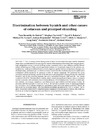Identificador persistente para citar o vincular este elemento:
https://accedacris.ulpgc.es/jspui/handle/10553/41718
| Título: | Discrimination between bycatch and other causes of cetacean and pinniped stranding | Autores/as: | de Quiros, Yara Bernaldo Hartwick, Meghan Rotstein, David S. Garner, Michael M. Bogomolni, Andrea Greer, William Niemeyer, Misty E. Early, Greg Wenzel, Frederick Moore, Michael |
Clasificación UNESCO: | 2401 Biología animal (zoología) 240111 Patología animal |
Palabras clave: | Bycatch Gas bubbles Stranding Cetacean Pinniped, et al. |
Fecha de publicación: | 2018 | Publicación seriada: | Diseases of Aquatic Organisms | Resumen: | The challenge of identifying cause of death in discarded bycaught marine mammals stems from a combination of the non-specific nature of the lesions of drowning, the complex physiologic adaptations unique to breath-holding marine mammals, lack of case histories, and the diverse nature of fishing gear. While no pathognomonic lesions are recognized, signs of acute external entanglement, bulging or reddened eyes, recently ingested gastric contents, pulmonary changes, and decompression-associated gas bubbles have been identified in the condition of peracute underwater entrapment (PUE) syndrome in previous studies of marine mammals. We reviewed the gross necropsy and histopathology reports of 36 cetaceans and pinnipeds including 20 directly observed bycaught and 16 live stranded animals that were euthanized between 2005 and 2011 for lesions consistent with PUE. We identified 5 criteria which present at significantly higher rates in bycaught marine mammals: external signs of acute entanglement, red or bulging eyes, recently ingested gastric contents, multi-organ congestion, and disseminated gas bubbles detected grossly during the necropsy and histologically. In contrast, froth in the trachea or primary bronchi, and lung changes (i.e. wet, heavy, froth, edema, congestion, and hemorrhage) were poor indicators of PUE. This is the first study that provides insight into the different published parameters for PUE in bycatch. For regions frequently confronted by stranded marine mammals with non-specific lesions, this could potentially aid in the investigation and quantification of marine fisheries interactions. | URI: | https://accedacris.ulpgc.es/handle/10553/41718 | ISSN: | 0177-5103 | DOI: | 10.3354/dao03189 | Fuente: | Diseases of Aquatic Organisms [ISSN 0177-5103], v. 127 (2), p. 83-95 |
| Colección: | Artículos |
Citas SCOPUSTM
40
actualizado el 08-jun-2025
Citas de WEB OF SCIENCETM
Citations
36
actualizado el 08-jun-2025
Visitas
165
actualizado el 27-sep-2025
Descargas
79
actualizado el 27-sep-2025
Google ScholarTM
Verifica
Altmetric
Comparte
Exporta metadatos
Los elementos en ULPGC accedaCRIS están protegidos por derechos de autor con todos los derechos reservados, a menos que se indique lo contrario.
